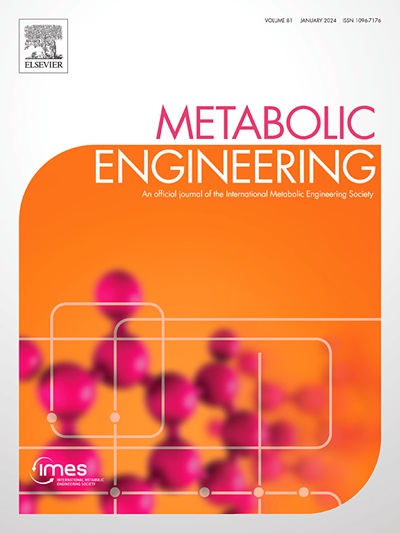Enhancing the production of isopropanol with reduced CO2 emission via protein and metabolic engineering using Corynebacterium glutamicum
IF 6.8
1区 生物学
Q1 BIOTECHNOLOGY & APPLIED MICROBIOLOGY
引用次数: 0
Abstract
Isopropanol (IPA), a versatile chemical with applications in various fields of industries, yet its petroleum-based production raises environmental concerns. In this study, Corynebacterium glutamicum was engineered to enhance IPA production while mitigating CO2 emissions. First, the rational design of secondary alcohol dehydrogenase (SADH) variants with shifted cofactor specificity from NADPH to NADH, resulting in an 11.11-fold increased NADH oxidation rate and 6.02-fold increased enzyme activity. Secondly, modified SADH was used in combination with the Ncgl1676 promoter in order to separate the growth and production phases. This engineering resulted in a strain called CGIPA-4, which showed a 2.45-fold increase in IPA production. To address CO2 emission, carbonic anhydrase from Hydrogenovibrio marinus (HmCA) and acetoacetyl-CoA synthase (nphT7) were overexpressed, constructing CGIPA-5 strain, enabling conversion of CO2 into bicarbonate, which supported IPA biosynthesis and reduced emissions by up to 21 %. Finally, high cell density fed-batch fermentation using CGIPA-5 strain produced 148.6 ± 3.8 g L−1 IPA, with CO2 emission reduced by 30 % compared to CGIPA-4 strain. This work demonstrates a sustainable approach to petrochemical replacement through protein and metabolic engineering.
利用谷氨酸棒状杆菌的蛋白质和代谢工程提高异丙醇的生产和减少二氧化碳排放。
异丙醇(IPA)是一种用途广泛的化学品,应用于各个工业领域,但其石油生产引发了环境问题。在本研究中,对谷氨酸棒状杆菌进行了改造,以提高IPA的产量,同时减少二氧化碳的排放。首先,合理设计辅助因子特异性从NADPH转移到NADH的二次醇脱氢酶(SADH)变体,导致NADH氧化速率增加11.11倍,酶活性增加6.02倍。其次,将修饰后的SADH与Ncgl1676启动子结合,分离生长和产生期;该工程产生了一种名为CGIPA-4的菌株,其IPA产量增加了2.45倍。为了解决二氧化碳的排放问题,我们将海洋氢弧菌(hydrogenvibrio marinus)的碳酸酐酶(HmCA)和乙酰乙酰辅酶a合成酶(nphT7)过表达,构建CGIPA-5菌株,使CO2转化为碳酸氢盐,支持了IPA的生物合成,减少了高达21%的排放量。最后,CGIPA-5菌株高密度补料分批发酵产生的IPA为148.6±3.8 g·L-1, CO2排放量比CGIPA-4菌株减少30%。这项工作展示了一种通过蛋白质和代谢工程可持续替代石化产品的方法。
本文章由计算机程序翻译,如有差异,请以英文原文为准。
求助全文
约1分钟内获得全文
求助全文
来源期刊

Metabolic engineering
工程技术-生物工程与应用微生物
CiteScore
15.60
自引率
6.00%
发文量
140
审稿时长
44 days
期刊介绍:
Metabolic Engineering (MBE) is a journal that focuses on publishing original research papers on the directed modulation of metabolic pathways for metabolite overproduction or the enhancement of cellular properties. It welcomes papers that describe the engineering of native pathways and the synthesis of heterologous pathways to convert microorganisms into microbial cell factories. The journal covers experimental, computational, and modeling approaches for understanding metabolic pathways and manipulating them through genetic, media, or environmental means. Effective exploration of metabolic pathways necessitates the use of molecular biology and biochemistry methods, as well as engineering techniques for modeling and data analysis. MBE serves as a platform for interdisciplinary research in fields such as biochemistry, molecular biology, applied microbiology, cellular physiology, cellular nutrition in health and disease, and biochemical engineering. The journal publishes various types of papers, including original research papers and review papers. It is indexed and abstracted in databases such as Scopus, Embase, EMBiology, Current Contents - Life Sciences and Clinical Medicine, Science Citation Index, PubMed/Medline, CAS and Biotechnology Citation Index.
 求助内容:
求助内容: 应助结果提醒方式:
应助结果提醒方式:


